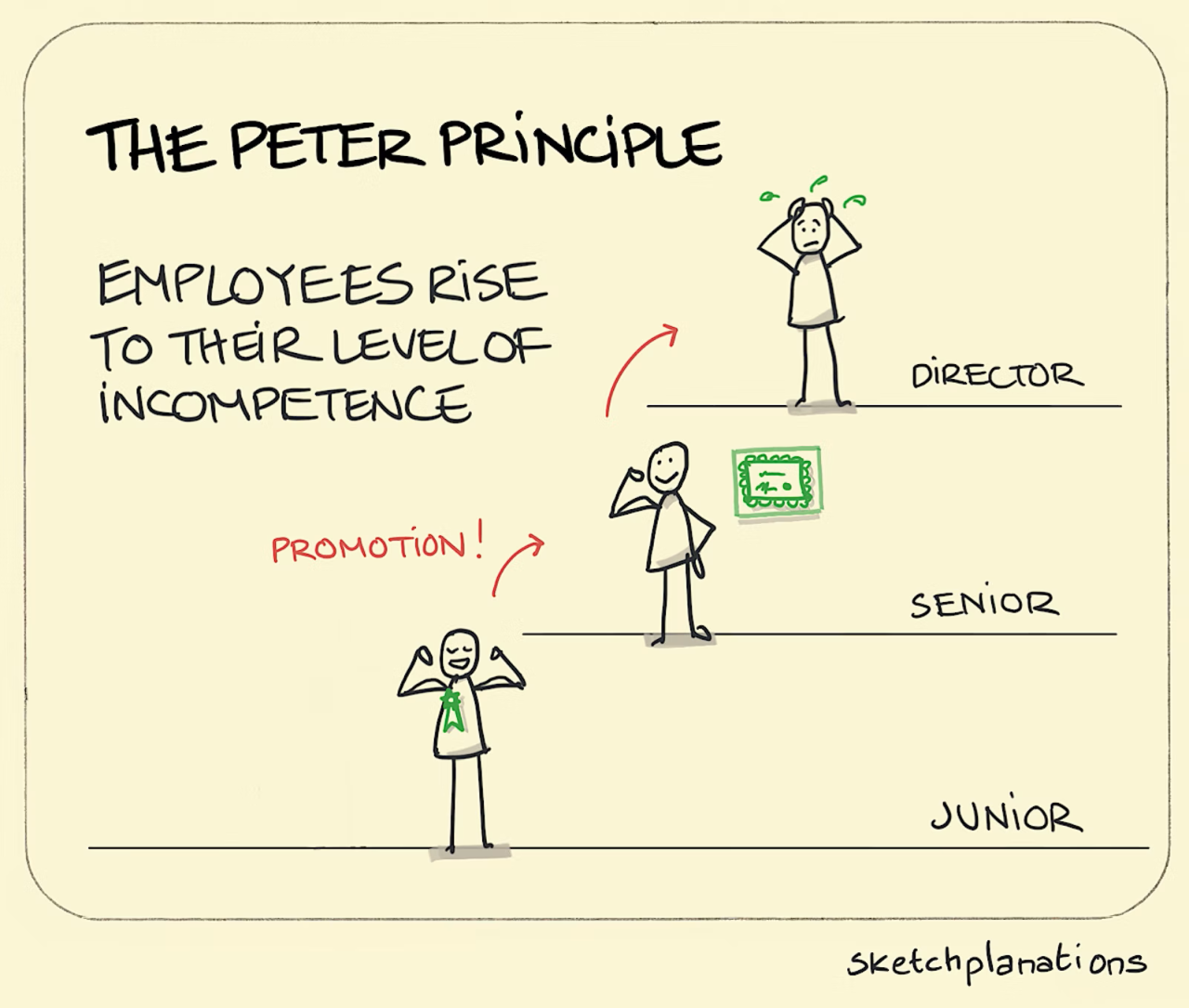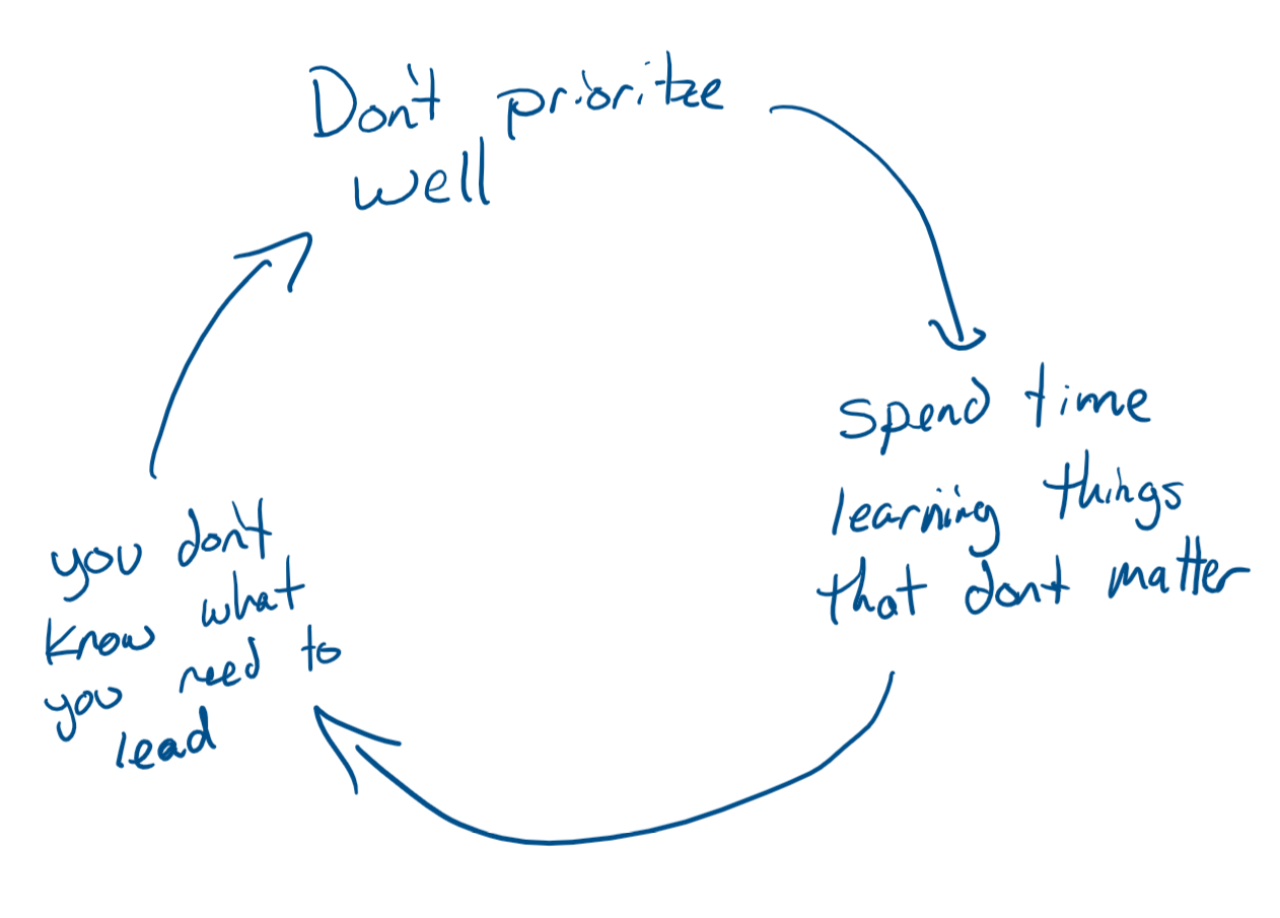When I first heard of the Peter Principle, I was like "Oooo a principle with MY name, it's got to be something good..."

It states:
"people in a hierarchy tend to rise to a level of respective incompetence: employees are promoted based on their success in previous jobs until they reach a level at which they are no longer competent, as skills in one job do not necessarily translate to another"
Ah crap. It was supposed to be something awesome like Parkinson's Law. Instead it just says I'll suck at a future role. Why can't my name be associated with anything awesome! I've got stuff like Peter Peter Pumpkin Eater (annoying), the phrase “Peter Out” (sad), Yelling PETER when you should stay away from the football on punt (gross 😆).
At least it was easy for me to remember.
The Peter Principle basically says you don't have the skills needed at the next level. People often naturally feel this and see it to be true so they go find courses to learn how to be better communicators, or learn how to delegate, they get an MBA.
They go out and learn something... it's just usually is not the right thing.
But do you know what they never go out and try to learn? Do you know the number one thing you need to get better at as you go up the ladder?
Being bad at prioritizing is hard to admit
The person that can put the right weight on the right variables is incredibly valuable to me...
Bobb Biehl (In this video from 9:56 to 11:06)
I don't know a single person who would say "I suck at prioritizing and I'm always doing things that aren't important." Very few people believe they are poor prioritizors ( apparently not a word, but I'm making it one), yet very few people are good at it. The quote above talks about how valuable it is and like diamonds or gold, part of its value comes from its rarity.
Why don't we admit it?
For you to admit that you suck at prioritizing, you have to acknowledge that you spend a lot of time doing things of low importance. Because of that, admitting you suck at prioritization is incredibly humbling and hard for us to admit.
Plus, you don't see the evidence of your poor prioritization skills yet. Or more likely, the impact of your poor prioritization is small. At least... for now it is.
This is where the Peter principle comes in.
You can hide behind execution
A person bad at prioritizing can easily hide behind their ability to execute.
Let me tell you a story about a made up person named Stacy.
In our story, we can easily measure how many tasks a person can do in a day. Stacy has a task capacity of 10, so that means she can do 10 tasks a day.
Her current job requires her to do only 8 tasks a day, so she always gets them all done. Since she always gets them done, she's never needed to learn to prioritize. Her boss loves her and promotes her.
Now she has 20 tasks a day... she feels like she is drowning a little bit so she goes and finds a task management system. Now with batching and timeboxing she is more efficient and can do 25 tasks a day. Again, she has never learned to prioritize.
Promoted again and now she is overseeing people. Her team is responsible for 100 tasks, but that's ok because their total task capacity is 120. Still she has not learned to prioritize. Only now, other people are doing low important tasks as well.
When you can "get it all done", you don't need to prioritize and you never SEE the problem.
Incompetency because of the inability to prioritize well
Eventually on her way up the leadership ladder, Stacy begins to make bigger and bigger decisions. The number of tasks that others are doing below her are in the thousands now. She has more expectations on her than ever before (from herself and others).
Now she starts to drop the ball. Metrics start to get missed. People see her teams or departments doing projects that just don't make sense.
"Why would you do that project when sales numbers aren't being met?", they start to say. New people, who don't know Stacy's excellent history say, "How did she ever get hired for this? I don't think she knows what she is doing."
Stacy has reached a level of incompetency. The Peter Principle is in the house. She never learned to put the right weight on the right variables at the right time.
It’s important to note that Stacy has all the other skills she needs for her current role (she is my imaginary friend so I can say what I want :P). She can build amazing teams, understands the market, has an MBA, communicates well, etc… Those are not the skills that are holding her back.
What holds her back is a single, learnable skill that she would never believe she didn't have. The ability to prioritize well.
Your personal growth is stunted when you prioritize poorly
Let me backup a second.
In my Stacy story she magically only lacked the ability to prioritize work or tasks. Since she is imaginary, she has a bunch of extra skills needed to lead at a high level like leadership skills, communication skills, financial analysis skills, etc…
But in real life, she would never have all those skills if she sucked at prioritization:

It’s an anti-growth loop. I’ll talk more about this in a future post, but if Stacy never learns to prioritize well, she’ll never prioritize the things she needs to learn at the next level and will end up missing more and more skills once she moves up.
She would have gotten as far as she did based on natural ability rather than her ability to decide and choose how to grow.
So you suck at prioritization… what do you do about it?
How to prioritize is not a part of this post. But that’s OK because you don't need a "how to" post yet. You need an "Admit you suck at prioritizing" post.
So here are my steps for you:
1. Admit you suck at it.
2.Don't feel bad, we all suck at it.There are systems & people to help... but not in this post.
3. Subscribe to my newsletter to get my future posts with more steps on this topic.
Highly scientific quiz to see if you suck at prioritization
You're still not convinced? Below are some questions you can ask yourself to see if you suck at prioritization. These are absolutely scientific... especially the last one.
Quiz:
Do you get to “inbox zero”? If you did, you suck at prioritizing. Email is usually low priority work and as you move up the ladder, it becomes even less important. Add 1 point.
Do you know the 3 outcomes (not tasks) that you want to happen this week? If you don't, add 1 point.
Do you know how your 3 weekly outcomes will affect your monthly/quarterly goals? (do you have quarterly goals?) If you don't, add 1 point.
What have you said "no" to this week that is a good thing? Anything at all? If not, Add 1point.
Is "shiny object syndrome" your middle name? Add 5 points.
Are you a perfectionist? Add 5 points.
Are you known for getting craploads of stuff done? Add 5 points.
Do you take time every month away from people and the internet to think? Subtract 5 points.
Is your name Stacy? Add 10 points… It’s science.
The more points you have, the more you suck. "Do not pass go, Do not collect $200". Go to the "how" section above.